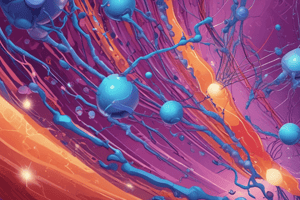Podcast
Questions and Answers
What is the primary source of interferons for industrial production?
What is the primary source of interferons for industrial production?
- Namalwa cell line (correct)
- E. coli
- Recombinant DNA technology
- Mammalian cell culture
Which type of interferon has weak antiviral and anti-proliferative activity but can potentiate the effects of type I interferons when co-administered?
Which type of interferon has weak antiviral and anti-proliferative activity but can potentiate the effects of type I interferons when co-administered?
- T-cytotoxic cells
- Natural killer cells
- Type I interferon
- Type II interferon (correct)
What is the effect of type I interferons on natural killer (NK) and T-cytotoxic cell activity?
What is the effect of type I interferons on natural killer (NK) and T-cytotoxic cell activity?
- Decrease
- Inhibit
- No effect
- Increase (correct)
Which type of cells does IFN-γ promote activation, growth, and differentiation of?
Which type of cells does IFN-γ promote activation, growth, and differentiation of?
What is the primary reason interferons were impractical to use as potential therapeutics in the late 1950s?
What is the primary reason interferons were impractical to use as potential therapeutics in the late 1950s?
What is the primary method used to produce most interferons currently in medical use?
What is the primary method used to produce most interferons currently in medical use?
What types of cancer have clinical studies shown interferons to induce regression of tumors in?
What types of cancer have clinical studies shown interferons to induce regression of tumors in?
Flashcards are hidden until you start studying
Study Notes
Overview of Interferons and their Biotechnology
- Type I interferons have antiviral and anti-proliferative effects on various cell types, including some tumor cells.
- Type I interferons can increase natural killer (NK) and T-cytotoxic cell activity, leading to anti-tumor effects.
- Different types of type I interferons have different antiviral to anti-proliferative activity ratios.
- Type II interferon, IFN-γ, has weak antiviral and anti-proliferative activity but can potentiate the effects of type I interferons when co-administered.
- IFN-γ promotes activation, growth, and differentiation of immune and inflammatory response cells, particularly macrophages.
- Interferons were initially identified as potential therapeutics in the late 1950s but were impractical to use due to low levels in the body and species preference.
- The Namalwa cell line became the primary source of interferons for industrial production.
- Interferons were produced in significant quantities by mammalian cell culture in the late 1970s.
- Recombinant DNA technology enabled the production of large quantities of pure interferon containing a single subtype.
- Most interferons currently in medical use are recombinant human products produced by E. coli.
- Clinical studies have shown that interferons can induce regression of tumors in patients with breast cancer, lymphomas, and multiple myeloma.
- Recombinant interferons have been approved for the treatment of various cancer types, with up to 90% of patients experiencing significant regression of the cancer.
Studying That Suits You
Use AI to generate personalized quizzes and flashcards to suit your learning preferences.




